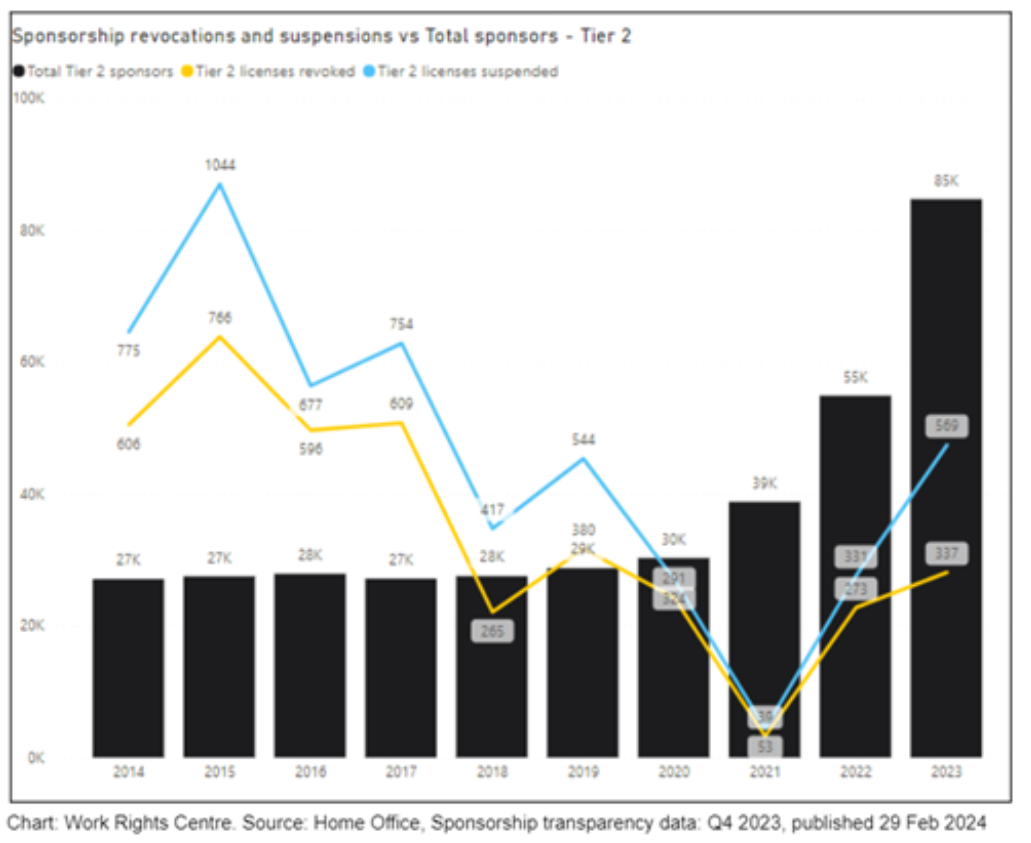Latest immigration stats reveal increasing risks for health and care workers
Looking at the Home Office's latest immigration statistics for October and December 2024, employment rights advocates should note three key things. First, the number of Health and Care Worker visas issued more than doubled compared with 2022. Second, more businesses are being licensed to sponsor migrant workers than ever before, and lastly, Home Office capacity to oversee them is doubtful.
A record number of Health and Care Worker visas were issued
A total of 85,701 Health and Care Worker visas were issued (to out-of-country applicants) between October and December last year, for main applicants and their dependants. This brings the total of Health and Care Worker visas issued in 2023 to 350,000, more than double the 2022 figure.
The distribution of nationalities remains similar to the year before. Just under one-third of workers were nationals of India, followed by those from Zimbabwe, Nigeria, and Ghana.
The increase in Health and Care worker visas issued is likely to continue to present workers’ rights advocates with a challenge. Past reports, including our own, have found that unscrupulous employers often take advantage of their power to withdraw sponsorship to exploit migrant workers and, worryingly, to prevent them from reporting exploitation. Media articles and our own clients described instances of non-payment, overwork, as well as financial exploitation of workers who were charged extortionate recruitment fees by rogue sponsors who had no intention of ever providing work (see our Systemic Drivers of Migrant Exploitation report).
Notably, despite these well-documented risks, the government introduced few new protections for workers. In the latest changes to the Immigration Rules the Home Office announced that new sponsors would have to be registered with the Care Quality Commission before they can employ migrant care workers. However, this is minor compared to the oversight needed to regulate the growing number of businesses authorised to sponsor migrant workers.
The number of businesses hiring skilled migrant workers is rapidly growing
Data from the Home Office shows that in 2023, 30,000 more businesses were added to the register of licensed sponsors, bringing the total number of employers authorised to employ skilled migrant workers to 85,000. Overall, this is a considerable 54% percent increase compared with the number of sponsors in December 2022, and well more than double the number of sponsors in 2021.
Not enough enforcement action is taken against rogue sponsors
The rapid growth in the number of sponsors raises serious questions about the Home Office’s ability to safeguard migrant workers. In 2023, the Home Office revoked 337 licences and suspended a further 569. This is an increase in enforcement action against sponsors compared to 2022, when the Home Office suspended just 331 licences and revoked another 273, but still far below the level for 2014 to 2017, when the number of sponsors was a fraction of what it is today.

Important questions remain about the Home Office’s ability to regulate sponsors, and safeguard migrant workers. First, there is a question of resourcing. David Neal, the former Independent Chief Inspector for Borders and Immigration (ICIBI) revealed in the Times last week that the Home Office has just 1 inspector for every 1,600 businesses. This is a serious cause for concern. Second, we do not know how many of the enforcement actions taken last year were directed at sponsors in the care sector, which is one of the most vulnerable to exploitation. The Home Office declined to share that data in response to Lord Oates’ written question. Third, and arguably most importantly, it is unclear how the Home Office is planning to safeguard and support migrant workers whose permission to stay in the UK is tied to the businesses it sanctions.
Increased migrant work exploitation is a real risk
The latest health and care visa immigration statistics point to a rapidly growing population of vulnerable migrant workers, in a sector which has already been identified as low-pay, low protection, and high-risk. Meanwhile, with the number of enforcement actions against sponsors inadequately low, there is a real risk that labour exploitation of migrant workers increases, and that rogue sponsors continue to act with impunity.
To prevent this from becoming a national crisis, we need an urgent reform to the system of sponsorship that governs. Read our proposed solutions to reform the sponsorship system in our Systemic Drivers report.
Please donate
To support the Work Rights Centre in our efforts to assist migrant workers please consider making a donation
